memories
wave after wave memories in a seashell
dusting my children’s bookshelves
the adventures we had
a conker in my pocket this time last year ![]()
Featuring Authors of Haibun, Tanka Prose, Haiga, and Related Forms
wave after wave memories in a seashell
dusting my children’s bookshelves
the adventures we had
a conker in my pocket this time last year ![]()
chough tumble
down the quarry face
rain turns to sleet
sharp frost underfoot a startled snipe
empty feeders
a frosty glint in
the robin’s eye ![]()
backlighting
a cloudy night ...
blood moon
eating more than we should strawberry moon
flower moon
her scent of jasmine
in every room ![]()
night fishing
a heron stalks the
hunters moon
harvest moon hidden by clouds a plovers call
winter moon
a twinkle in the
snowman’s eye
![]()
a June bride
... mum’s dress
tinted peach
forest bathing fifty shades of (green)
after the storm
gathering windfalls ...
pinkfeet calling ![]()
Postscript
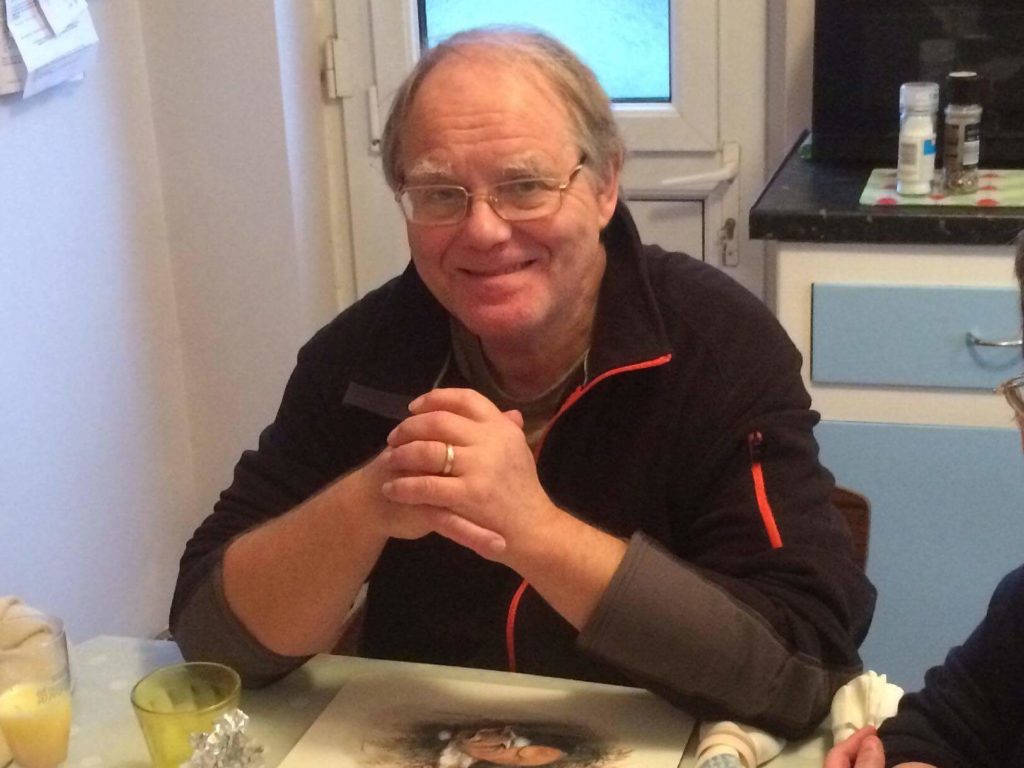
Well that’s it! You were great company. I’m still writing haiku so maybe we’ll catch up with another reading sometime.
Thanks especially to editors – Paul Chambers and Joe Woodhouse (Wales Haiku Journal), Caroline Skanne (hedgerow: a journal of small poems), and Alan Summers (The Pan Haiku Review/Blo͞o Outlier Journal) who were the first to publish many of the haiku included here and continue to do so.
I’m not a prolific writer of haiku so it’s been an honour to have some of them taken up by other well known journals. Thanks then to the editors of …
failed haiku – a journal of English Senryu
Presence Haiku Journal
first frost – journal of haiku & senryu
tsuri-dōrō – a small journal of haiku, senryū
Scarlet Dragonfly Journal
民句 folk ku: a journal in honour of Masaoka Shiki
With special thanks to Colin Blundell, a former President of the British Haiku Society and fellow traveller along the byeways of ‘Jefferies Land’, who unwittingly, sparked my interest in writing haiku.
To Paul Chambers the then editor of the Wales Haiku Journal, and award winning haiku poet, who took my very naive, gawkish first attempts at writing haiku and helped me work them up into something worthy of the name.
And to Jodie Hawthorne of King River Press whose energy and enthusiasm for following her own dreams inspired me to follow mine.
————————-
About the Author
‘I’m older than I look … and younger than I am’ — Clive Bennett
Sometime philosopher, thinker, dreamer, birdwatcher, poet, and occasional writer. Living and writing in beautiful North Wales.
in memoriam
we never talked …
undiagnosed
a difficult child …
if only he knew
the hurt inside
not knowing myself
(In the form of a cherita turbalik 1-3-2 (ai li))
![]()
wild camping
a robin joins us
for breakfast
the bark of a raven echoing … the silence
best of friends
… beside the fire
teenage crush
![]()
wagtails skitter
around the yard
evening milking
skipping stones one two three fourfivesixseveneight
wagtails …
playing hopscotch
after school
![]()
Sometimes my haiku (senryu) stray into the realm of social commentary …
dossing among
the cardboard boxes
a homeless dog
dodging traffic jackdaws finish my breakfast croissant
happy hour
… marking time
a leaf falls !
![]()
hide-and-seek …
in the churchyard
a new headstone
taking tea with grandma she reads our fortunes
trick or treat—
screech owls ghost
the graveyard
![]()
winter solitude
the fading shadow
of my footprints
Now still with a winter theme here is something really special. Just listen to the music inspired by this haiku (Naviar Records #478). Not everybody’s taste but love the creativity …
distant hills beyond the gate winter stillness
This digital music track composed by ‘zenbytes’. You can hear the complete playlist here – Distant Hills
drifting snow
the only sound
my footsteps
![]()
So here’s some more haiku about birds. Well one particular bird – Britains National bird – the Robin. I’ve written a few haiku about them but the split sequence inspired by Cheryl’s text was an inspiration. You may have to read it a few times to get the hang of it though.
There’s no mistaking it; the festive season is well and truly upon us. Christmas trees, laden with baubles and twinkling lights, can be seen popping up in windows all over the country and it won’t be long before we start coming home to find Christmas cards lying on the doormat.
Chances are that at least one of these messages from loved ones will have a robin gracing the front cover.
One of the strongest associations between robins and Christmas cards can be traced back to the days of the Victorian postie. For a time, Royal Mail postmen wore bright red uniforms which soon earned them the nickname ‘robins’. As the exchange of Christmas cards grew in popularity, depictions of robins holding cards in their beaks began to appear. A trend was born and, over a century later, robins are still one of the most favoured images on the market.
As well as adorning our mantelpieces, the robin is also responsible for the snatches of birdsong that can be heard in our parks and gardens at this time of year. Unlike most other songbirds who fall silent after the breeding season has come to an end, the robin continues to make himself heard. His song does change depending on the season; the winter song definitely has a frostier feel than the sweeter tune we hear in the spring. This may have something to do with the changing function of the song. In the spring months, the male robin has love on his mind. He is looking for a mate and, though he still needs to defend his territory against potential rivals, his song has a smoother quality. When winter strikes however, romance goes out of the window. It’s all about survival, which leaves no room for any sweet talk. Don’t be fooled by the charming melody though – if you were a robin he would try to take you down in a second.
Cheryl Tipp, Curator of Wildlife & Environmental Sounds – British Library
Source: The Christmas robin – Sound and vision blog
—————————-
songs from the wood
under his breath
winter robins
… posting early
for Christmas
our postie hums
lights twinkle
in every house
a robin on the
mantle
a favourite carol
solstice bells
deep in the holly
a robin sings
A split sequence (Peter Jastermsky) about robins (with special thanks to Caroline Skanne editor of Blithe Spirit and founding editor and publisher of hedgerow), who loves robins as much as I do.
![]()
raven tumble
from snow-filled skies
winter games
cold moon the heron’s frozen shadow
fresh snow
drifting from the sky
winter swans
![]()
Winter can drag on a bit here and in shady places the blackthorn winter lingers, sometimes well into April. But often a couple of warm days in late February or early March and before you know it …
hanging out
our winter woolies
first swallow
primroses in the hedgerow bank a robin’s nest
distant bells
across the fields
cuckoo song
![]()
So here’s a few haiku about birds. In these I use sound and visual imagery to enhance a sense of place. Quite a common theme in my haiku …
swift scream
down cobbled streets
bikers follow
above the river beat the sound of drumming snipe
somewhere—
a redshank call
lost in the fog
![]()
PART TWO
among the driftwood
‘Haiku along with other poems deserve more than one reading. If possible, they should be read aloud. While they often spark immediate recognition and appreciation, they give up their full meanings more slowly. They are, in fact, the most compressed of all poems. I like to think that means they are charged with extra energy and vitality. Certainly, they engage the reader as a co-creator.’ – Peggy Willis Lyles (1939 – 2010).
But first some music (Nature by AShamaluevMusic) to set the mood. You don’t have to play it – it’s your choice. But I think it works …
My haiku have been variously described as ‘transcendental’ – ‘inspiring, interesting, and brilliantly written.’ Like ‘love letters to nature’ – ‘conjuring many layers of loveliness, with the lightness of gently falling leaves’. Such beautiful words to treasure. Thank you! (Josie Holford, Isabella Kramer, Jodie Hawthorne, and Rosalind Maud).
So gently shoosh the cat out of the chair and when you’re ready … But if you’d like to know a little more about me and how I became a haiku poet, assuming you haven’t read that part already, then here’s a link – across the meadow – which will take you back to the start of my haiku story.
Oh and if you haven’t already twigged most of my haiku are about birds – these first two (both tanka) though, written for my wife Jan, being the exception …
on the beach
a stolen moment
hand in hand
among the driftwood
a mermaids purse
****
waking up
… next to you
waking up
we snuggle back down
under the covers
across the meadow – part 8 (Contd)
![]()
I’m fit and well now thank you. Mostly anyway, although other bits of me are beginning to wear out. Retired and living the dream. And I’m writing haiku …
So put the kettle on and make a brew – or pour your favourite tipple. Play some music and sit back and read my haiku. Aloud! It’s ok there’s no one listening. Well maybe the cat. And don’t forget the chocolate biscuits.
Oh and if you let me, I’ll read some of my own haiku for you. I’ll start if you like. Just press play …
Coming back from a late evening walk at the tail end of summer I paused by an old farm gate and gazed out over the rough grazing and willow scrub …
… and then they came – one for sorrow, two for joy … twenty, thirty, a hundred, two hundred – from all directions. I lost count …
dusk settling
over the marsh
magpie roostAnd still they came but by then it was too dark to see!
So when you’re ready let’s flip the page and read some haiku …
![]()
Still having to take it steady I read haiku, loads of haiku – learning about the fragment and phrase, use of space, juxtaposition, kigo and cutting words or kireji.
One book stood out, not because it was a weighty tome on haiku, but because it was about birds in haiku – ‘Wing Beats: British Birds in Haiku’ by John Barlow and Matthew Paul, published by Snapshot Press. I knew about birds, their songs and behaviour their jiz – what made them tick as it were. So this became my go to book for all things haiku.
easy listening
a woodpigeon croons
an old favourite
But it was Paul Chambers the then editor of the Wales Haiku Journal, and award winning haiku poet, who took my very naive, gawkish first attempts at writing haiku and helped me work them up into something worthy of publishing. Here they are …
red skies—
from wind-tossed trees
stormcock sing
drifting snow
shattering the silence
a wren sings
If I’m writing at least half-way credible haiku today it is because of his patience, encouragement and ultimately belief. I can’t thank him enough.
Hyper-focussed now on finding out all there was to know about haiku, I also read about haiku techniques by the late Jane Reichhold – sense switching, the use of metaphor and simile, wordplay and the above as below technique.
And then a light bulb moment I read the Poetic Spell by Martin Lucas (1962 – 2014),
founder and editor of Presence, and a friend and colleague of John Barlow and Matthew Paul. A fellow birdwatcher he has had a lasting influence on my haiku writing …
squally showers
sweeping the saltings
the peewit’s cry
What did he mean by poetic spell.
…. words that chime; words that beat; words that flow. And once you’ve truly heard it, you won’t forget it, because the words have power. They are not dead and scribbled on a page, they are spoken like a charm; and they aren’t read, they’re heard. You can hold them in the light and turn them about and watch each of their facets gleam. They begin and end each reader’s unique reflection …
first light the pink of chaffinch in the cherry
And finally back to Bashō and his concept of karumi. Like so many of Bashō’s critical terms, karumi defies easy definition. Essentially meaning a lightness of touch, stressing simplicity and leanness, relaxed, rhythmical, seemingly artless expression leaving a space for the reader to become an imaginative participant. It also implies rhythm and attention to the poetry of the ear, especially those sound patterns that generate emotional connotations.
Heavily paraphrased from ‘Traces of Dreams: Landscape, Cultural Memory, and the Poetry of Bashō’ (Stanford, California: Stanford University Press, 1998, by Haruo Shirane).
Not every haiku will have this but it’s worth striving for. In the end some poems just work …
waking up the sounds of the day waking up
It’s very much your poem – wherever you lay your head!
![]()
So why did I start writing haiku – I wasn’t a poet and didn’t read poetry. Wait! Haven’t we been here before. I wasn’t a writer either – although I had tried my hand at a couple of creative non-fiction pieces for bird watching magazines. But then a period of enforced rest, after major surgery, got me thinking about life – as you do – it’s transience!
All I could really do was read (I’m not a TV or Netflix person). And think. I’m quite good at thinking. So back to reading Richard Jefferies and thinking about life. In my youth I had walked the same hills, downs, woods and meadows as he had – and sometimes in some quiet corner of a meadow or a wind blown hilltop I could (almost) feel his thoughts.
This then was when I happened upon Colin’s book – Something beyond the Stars (1993). A book of Found Haiku from the Notebooks of Richard Jefferies.
So to help pass the time, I started looking for ‘found’ haiku in some of Jefferies’ other works. This is beginning to feel like it’s turning into a monologue on Richard Jefferies. But I find his books a constant source of inspiration. Many of my haiku have started life in his writings and essays – a pairing of his prose with my haiku; his prose reimagined. So I make no apologies for yet more haiku intuited from his words …
For Richard Jefferies the freedom of a bird’s life was appealing, as was a bird’s ability to live in tune with its surroundings and take delight in the natural rhythms and beauties of the seasons.
[…] “Presently a small swift shadow passes across—it is that of a hawk flying low over the hill. He skirts it for some distance, and then shoots out into the air, comes back half-way, and hangs over the fallow below, where there is a small rick. His wings vibrate, striking the air downwards, and only slightly backwards, the tail depressed counteracting the inclination to glide forwards for awhile. In a few moments he slips, as it were, from his balance, but brings, himself up again in a few yards, turning a curve so as to still hover above the rick.” […]
Wild Life in a Southern County (1879)
Jefferies’ passion for birds shines through his text. His description of a Whitethroat below like no other and probably never equalled. …
[…] “Suddenly he crosses to the tops of the hawthorn and immediately flings himself up into the air a yard or two, his wings and ruffled crest making a ragged outline; jerk, jerk, jerk, as if it were with the utmost difficulty he could keep even at that height. He scolds, and twitters, and chirps, and all at once sinks like a stone into the hedge and out of sight as a stone into a pond.”[…]
The Life of the Fields (1887)
But is there a haiku to be ‘found’ …
bursting through his song a whitethroat
But ‘finding’ haiku, fun and somewhat addictive as it is, isn’t like actually writing haiku – not really, is it.
So back to my reading …
across the meadow – part 6
![]()
They were awful years. Working in a 9-5 office job ripped the heart and soul out of me. As someone born of the outdoors – the claustrophobic spaces, the bright lights the noise and people, so many people – was unbearable! When I could, I would bunk off and go for long walks across the fields, or up on the hills and downs, with Richard Jefferies my guide and companion. And think thoughts.
“Stepping up the hill laboriously, suddenly a lark starts into the light and pours forth a rain of unwearied notes overhead. With bright light, and sunshine, and sunrise, and blue skies the bird is so associated in the mind, that even to see him in the frosty days of winter, at least assures us that summer will certainly return.”
(Out of Doors in February – Richard Jefferies 1882)
up on the downs a skylark takes me higher
Sometimes, in late summer or early autumn, I’d stay up on the downs and watch the stars appear, one by one – mirrored by the cottage lights in the valley far below …
It was a strange feeling – like being between two worlds – a childlike feeling of wonder and awe at the infinity of the night sky, yet comforted and reassured by the human presence below. The curlew’s call a portal between the two.
lights twinkle
in darkening skies
a curlew’s cry
But in spring and early summer, still waking with the birds, even on a work day, I would walk across the fields to the river … listening to the birdsong. Neither night nor day, there was a tangible change in the air and an imperceptible, almost subliminal lightening of the sky.
The blackbird’s whistle is very human, like a human being playing the flute; an uncertain player, now drawing forth a bar of a beautiful melody and then losing it again. He does not know what quiver or what turn his note will take before it ends; the note leads him and completes itself. It is a song which strives to express the singer’s keen delight, the singer’s exquisite appreciation of the loveliness of the days; the golden glory of the meadow, the light, the luxurious shadows, the indolent clouds reclining on their azure couch. … Now and again the blackbird feels the beauty of the time, the large white daisy stars, the grass with yellow-dusted tips, the air which comes so softly unperceived by any precedent rustle of the hedge, the water which runs slower, held awhile by rootlet, flag, and forget-me-not. He feels the beauty of the time and he must say it. His notes come like wild flowers, not sown in order. The sunshine opens and shuts the stops of his instrument
(From Jefferies’ essay ‘The Coming of Summer’)
sunny days tease a blackbird’s song
And on weekends I would roam the fields, woods and water-meadows, all the day long, as I did when a child.
‘Butterflies flutter over the mowing grass, hardly clearing the bennets. Many multi-coloured insects creep up the sorrel stems and take wing from the summit. Everything gives forth a sound of life. The twittering of swallows from above, the song of greenfinches in the trees, the rustle of hawthorn sprays moving under the weight of tiny creatures, the buzz upon the breeze; the very flutter of the butterflies’ wings, noiseless as it is, and the wavy movement of the heated air across the field cause a sense of motion and of music.’
(An extract from Jefferies’ essay, ‘Woodlands’, from ‘Nature Near London’)
a warm wind across the meadows the hum of bees
Now, many many years later, happily married (I met my darling wife through work so it can’t have been all bad) with grown up kids, my walks and introspection, have been, and continue to be, a rich source for my haiku.
Why don’t you join me some fine morning – or at least poke your head outdoors and listen, just for a moment, to the birds … waking up.
![]()
The swinging ‘60s. Bob Dylan, the Beatles and Birds! No not the mini-skirted ones hanging out, downtown, in parks and city streets, nor the collared dove, though I was seduced for a while. And a pretty girl can still turn my head today, much to my wife’s annoyance. Think Felise in the novel – ‘The Dewy Morn’ by Richard Jefferies.

“Felise walked up out of the water on to the turf and sat down at the edge of the shadow of the trees. … She thought of nothing but the sun and wind, the flowers and the running stream. She listened to the wind in the trees and began herself to sing – singing of ‘the woven embroidery of the earth’ threaded into her very being …”
Pure beauty (of imagination). And nothing to do with sex! Well maybe it is. I don’t know but that’s all you’re going to get. Now back to birds.
I saw plenty of birds on the local allotments – the only bit of green anyways near a stones throw of our new home. It became my ‘local patch’. I ticked off most of the commoner birds – blackbird, song thrush, woodpigeon, dunnock blue and great tits, chaffinch, goldfinch, whitethroat – and yellowhammers. It was also on my way to school – well sort of. I was often late!
But there were distractions at school too. No not girls. Well maybe!
daydreaming
waiting for the bell
my piano tutor
I had a sort of crush on my music teacher – she was kind and beautiful. I imagined her a bit like Felise. She seemed to know how I pined for the woods and fields of my early childhood. Even today, on the rare occasions I hear the song of a yellowhammer, the memories come flooding back.
humming along
to Beethoven’s fifth
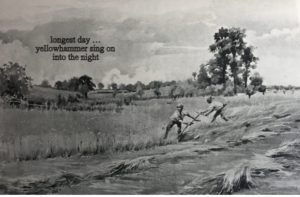
[…] ‘There is sunshine in the song – and whose colour, like that of the wild flowers and the sky, has never faded from my memory. His [Yellowhammer] plumage gives a life and tint to the hedge, contrasting so brightly with the vegetation and with other birds. His song is but a few bars repeated, yet it has a pleasing and soothing effect in the drowsy warmth of summer.’ […]
Wild Life in a Southern County (1879)
There was a lake too, a short cycle ride away, where in the summer hols, I would go to watch birds. And think! At one end there was an old church idyllically located on it’s own Island with a little stone bridge over the moat …
still waters
a fish jumps … through
my reflection
Colin kindly commented – “This is, dare I say, ‘perfect’ (as perfect as these things ever are) where ‘reflection’ means two things at the same time – something on the water and meditation interrupted by the conceptual fish that often disrupts ordinary thinking in everyday life.”
And on days when midsummer clouds scudded across the sky, I would sit under some willows and read Richard Jefferies – a kindred spirit who seemed to think and feel the way I did.
coot skitter
among lily pads
summer rain
They say that schooldays are the best days of your life. I’m not so sure. But they were a hell of a lot better than the following years.
![]()
‘… long, long time ago, I can still remember …’ go the lyrics to American Pie (“The Day the Music Died”) by Don Mclean. I remember watching the news of the plane crash in 1959, when Buddy Holly, Ritchie Valens, and The Big Bopper died. I used to sing along to Buddy Holly songs – well when I say sing that’s probably stretching it a bit. The Headmaster said I was tone deaf and banned me from the choir. You’ll just have to imagine my rendering of ‘Peggy Sue’!

But I digress, I remember because it also marked a huge change in my life as we had recently moved from the country to the suburbs of Bath. I hated change and couldn’t handle the move at all for years after … Even now, especially in spring, just like mole I get a hankering to revisit my old home. Long gone now, replaced by an ‘architect designed des res’ but still it pulls me.
waking up
the sounds of the day
waking up
I was at home playing in the woods and fields. Sometimes I’d be out all day; waking with the birds – sparrows, always sparrows chattering from under the eaves, and tree sparrows twittering from a nearby ash (and if I was lucky, a green woodpecker or cuckoo calling). And only coming in, reluctantly, as the owls began hooting, and the blackbird had sung his last song.
punctuating time
a blackbird’s song
Going to bed had its own challenges. While the outdoors held no horrors even in the dark, my bedroom lit only by a single oil lamp, had lots of spooky corners. And a wardrobe. Scary! Even the patterns on the wallpaper seemed to move.
shadows on the wall chasing sleep
Was I lonely – I don’t think so. Or did I ‘learn to be lonely’ as in the Andrew Lloyd Webber’s song from Phantom of the Opera (covered here beautifully by my daughter Bea … Excuse the plug!)
‘Child of the wilderness’ … The lyrics say it all!
I was, I suppose, a precocious child. I could read and spell, even quite difficult words like ‘intelligence’, before starting school, but struggled with writing and arithmetic.
I hated school! I didn’t fit. Had few friends. And thought and behaved differently. I spent an awful lot of time reading or staring out the window …
Hidden
I turned the page.
[…] “‘I have amazing news for you – and indeed for every bird-lover in the country,’”he whispered. […]It was my first day at Junior (Primary) school and I had picked a book to read, from the library shelves.
“Bennett! What are you doing ?”
“Reading, Miss” (I hadn’t heard the Headmistress come into class). “We were told to”, Miss.
“What have I been talking about?”
“Dunno, Miss.”
“Come here!” (six raps on the knuckles for not paying attention and six more for answering back). “Write out, in your best handwriting, ‘I must not read in class’. Twelve times!”
Did she know that my writing was awful. I could read, and spell almost anything, but write – I couldn’t write for toffee.
I returned to my desk and stared out the window; a Green Woodpecker flew up into the trees bordering the grounds of the old Rectory. Overgrown and unkempt – a place of mystery and adventure. …
I sneaked a look at the next page.
[…] “‘As I suspected, the birds you saw and which I have been watching for fifteen minutes are Bee-eater.’”[…]The bell rang …
morning assembly
sparrows chattering
in the playground
As told to my son many many years later. He ‘got it’ straight away! Made me think.
But it was this book ‘The Fourth Key’ by Malcolm Saville that inspired and fed my passion for watching birds … that was to last a lifetime.
![]()

A serialisation of my semi-autobiographical ebook of haiku. A sort of poetic memoir. A story of “inspirations illustrated with wonderful poems and writings” (Andrea Stephenson).
I’ve quoted Richard Jefferies rather a lot. He and I share an affinity with nature and the countryside, with my haiku often ‘found’ or intuited from his prose, an effective foil to his ‘gushing’ (R.H.Blyth) writing.
Oh and it also has the odd bit of music and occasional birdsong too.
The front cover and coloured illustrations are from woodblock prints by Ohara Koson (Ohara Hōson, Ohara Shōson Kanazawa 1877 – Tokyo 1945) who was a Japanese painter and woodblock print designer of the late 19th and early 20th centuries, at the forefront of shinsaku–hanga and shin–hanga art movements.
Koson is known for his depictions of birds and animals, which were often set in naturalistic landscapes. His prints capture the essence of his subjects with delicate lines and intricate details. Koson was influenced by the work of the Kacho-ga artist Imao Keinen, and his prints reflect a similar interest in the beauty and intricacy of the natural world.
The black and white landscape photos were prepared by Miss Bertha Newcome and published in “Richard Jefferies A Study” by H S Salt 1883.
The birdsong recordings are used here under the Creative Commons Attribution-NonCommercial-NoDerivs4.0 license. These and many more can be found at – Xeno-Canto – a website dedicated to sharing bird sounds from all over the world.
All rights reserved. This ebook, or any portion thereof may not be reproduced or used in any manner whatsoever without the express written permission of the publisher, except for the use of brief quotations in a book review. Any errors, omissions or inaccuracies, grammatical or otherwise, are entirely my own.
Copyright © 2023 Clive Bennett
Dedicated to Colin Blundell (1937 – 2023)
🕊️
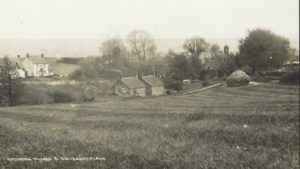
[Suddenly] “… a lark starts into the light and pours forth a rain of unwearied notes overhead. With bright light, and sunshine, and sunrise, and blue skies the bird is so associated in the mind, that even to see him in the frosty days of winter, at least assures us that summer will certainly return.“ . . .
distant bells across the fields skylark song
(Out of Doors in February – Richard Jefferies 1882)
So how come I started writing haiku – I wasn’t a poet and didn’t read poetry. Not since school anyway although the line ‘we have no time to stand and stare’ (‘Leisure’ W.H. Davies), had somehow stuck with me. I wasn’t a writer either. But I loved reading. And had done from a very young age. Mum had lots of books. I discovered the North Pole, messed about on the river, travelled to the centre of the earth, followed Alice down the rabbit hole and walked with Richard Jefferies up Liddington Hill – countless times …
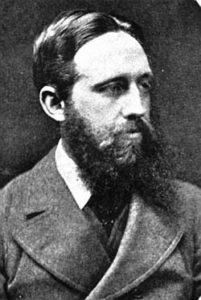
It was quite by accident. I had picked up a book (more about that later) by Colin Blundell ’Something Beyond the Stars’ (Found Haiku from the Notebooks of Richard Jefferies). I didn’t know Colin from Adam (although I was to correspond with him subsequently – Colin that is).
Sadly I never got to meet him, but we shared a passion for the nature writing of Richard Jefferies. Colin believed that within Jefferies’ eloquent prose there were zen-like moments of ‘suchness’ which could be ‘teased out’ or ‘found’ and expressed as haiku. Moments Jefferies himself said he sometimes ‘lacked the words’ [Sic] to express.
Richard Jefferies, widely considered the father of English nature writing, was perhaps the most brilliant observer of nature of the 19th century. I’d read a lot of his work but this was something new, different and exciting. I didn’t think anyone had looked at his life in this way before. Indeed, as Colin argues “his whole philosophy could be said to be built upon such haiku-moments.” I would go further and say that much of his writing is prose written in the manner of haiku. Now there’s a thought!
So what better than to find my own haiku in his writing …
Here’s a favourite passage of mine from ‘The Story of my Heart’ (1883) – his spiritual autobiography.
“There were grass-grown tumuli on the hills to which of old I used to walk, sit down at the foot of one of them, and think. Some warrior had been interred there in the ante-historic times. The sun of the summer morning shone on the dome of sward, and the air came softly up from the wheat below, the tips of the grasses swayed as it passed sighing faintly, it ceased, and the bees hummed by to the thyme and heathbells.” . . .
summer grasses dreaming the dreams of warriors
Similar, perhaps too similar, to Bashō’s ’Summer Grasses’, my intuited haiku (monoku) is meant not as an allusion, though it is that, albeit a weak (in content) one, but more an example of how Jefferies approached what he saw in the world around him with a sensibility akin to Bashō.
Summer grass
the only remains of soldiers’
dreams
(translated by Jane Reichhold)
Here’s another favourite …
“‘There’s the cuckoo!’ Everyone looked up and listened as the notes came indoors from the copse by the garden. He had returned to the same spot for the fourth time. The tallest birch-tree—it is as tall as an elm—stands close to the hedge, about three parts of the way up it, and it is just round there that the cuckoo generally sings. From the garden gate it is only a hundred yards to this tree, walking beside the hedge which extends all the way, so that the very first time the cuckoo calls upon his arrival he is certain to be heard. His voice travels that little distance with ease, and can be heard in every room.”
The Hills and the Vale (1909)
sunshine filling every room the cuckoo’s call
There is a spirituality in his writing suggestive of an ‘animist’ approach to nature. He clearly felt that all things—plants, animals, stones, even weather—are sentient and alive. And once described the downs as being ‘alive with the dead’.
“… there was magic in everything, in the blades of grass and the stars, the sun and the stones upon the ground”
(Bevis, 1882)
All of which of course lends itself to haiku which too has its roots in animism.

I’ve always felt at one with nature (and the wider Universe). The warrior buried in the mound is as real to me now as it was to Richard Jefferies then. And so my haiku storey begins. But I’m getting ahead of myself. Perhaps it all really started way back in childhood all those years ago.
![]()
we never talked …
undiagnosed
a difficult child …
if only he knew
the hurt inside
not knowing myself
![]()
swallows swoop
between the bales
the scent of rain
switching stations
to catch the weather
![]()
It’s 4.30! Waking up I look out onto a mascara smudged sky riven with pink glow lipstick – the aftermath of last nights storm. Starlings whistle and fizz from the chimney pot. And Sparrows chirp from under the eaves. A song thrush sings ‘Sweetheart’ ‘Sweetheart’ ‘Sweetheart’, or ‘Cherry B’ ‘Cherry B’ ‘Cherry B’ as the sun breaks through. A wren scolds …
….. listening to the goldfinches …; listening to the swallows as they twitter past … the chaffinches ‘chink, chink;’ thrushes, and distant blackbirds in the oaks; ‘cuckoo, cuckoo;’ `crake, crake;’ buzzing and burring of bees, coo of turtle-doves, now and then a neigh to remind you that there are horses, fulness and richness of musical sound; a world of grass and leaf, humming like a hive with voices ….*
waking up
the sounds of the day
waking up
————————-
Create your own (virtual) Dawn Chorus from the playlists. Cue them in at differing times to get the full effect. Perhaps starting with the song thrush which has the longest playing time.
Tip: If you’ve come to this post via my ebook “always sparrows” open both the blog post and the book in separate windows. You can flip between the two and your choice of birdsongs will continue to play. It’s even easier if you have a device which can operate in split screen mode.
punctuating time
a blackbird’s song
—————-
This post is the first in a proposed series of posts in support of my interactive semi-autobiographical ebook of haiku – ‘always sparrows’ – with over 60 haiku, and other Japanese short-form poetry. Please leave a comment, or drop me an email if you’d like a free downloadable copy.
Copyrights
The birdsong recordings are used here under the Creative Commons Attribution-NonCommercial-NoDerivs4.0 license. These and many more can be found at – Xeno-Canto a website dedicated to sharing bird sounds from all over the world.
* An extract from the nature essays of Richard Jefferies
![]()
A collection of my published short form poetry (2019-2023), set to music and birdsong.
My chief delight is in nature, and when I read a book, or look at a painting, it is to find something about nature in it. So it is with writing, where I try to express the feeling engendered by nature which is, to me, the most important thing in life (After W H Hudson – ‘Afoot in England’ – 1909).
Mostly I write and blog about, well about birds. So it seemed natural that when I first started writing haiku (early 2019), they were also about birds … taking inspiration from nature, but also from paintings of birds, their songs, and from the nature writings and essays of some of our greatest nature writers and poets—insightful reflections of birds—in art and anecdote, poetry and prose.
![]()
Hidden
I turned the page.
[…] “‘I have amazing news for you – and indeed for every bird-lover in the country,’”he whispered. […]
found again
It was my first day at Junior (Primary) school and I had picked a book to read, from the library shelves.
“Bennett! What are you doing ?”
“Reading, Miss” (I hadn’t heard the Headmistress come into class). “We were told to”, Miss.
“What have I been talking about?”
“Dunno, Miss.”
“Come here!” (six raps on the knuckles for not paying attention and six more for answering back). “Write out, in your best handwriting, ‘I must not read in class’. Twelve times!”
Did she know that my writing was awful. I could read, and spell almost anything, but write – I couldn’t write for toffee.
She kept the book.
I returned to my desk and stared out the window; a Green Woodpecker flew up into the trees bordering the grounds of the old Rectory. Overgrown and unkempt – a place of mystery and adventure. …
a secret garden
We turned the page.
[…] “‘As I suspected, the birds you saw and which I have been watching for fifteen minutes are Bee-eater.’”[…]
My son finally asleep, I stared out the window towards the blue line of distant hills. Thoughtfully, I put the book back on his bedroom shelves.
my childhood
Originally Published in the Blo͞o Outlier Journal Issue #2 Summer 2021
—————-
found again
… a secret garden
my childhood
![]()
A Day in the Life
daydreaming
morning assembly
sparrows chattering
in the playground
waiting for the bus
sparrows swirl
around the square …
another leaf falls
my piano tutor
sparrow song
under the eaves …
brahms lullaby
![]()
Let’s go for a walk; a walk around your local wood or park. It’s early morning and there’s only you and maybe one or two dog walkers about. The grass is still wet with dew. You follow a pathway through the bluebells. There’s hardly a sound. Weak sunshine filters through the branches. You breathe the fresh air – and smell the scent of pine trees. Presently you come to a small clearing; The air is cool, but comfortable. You pause for a moment. The leaves on the trees shift and sway in the gentle breeze making a moving dappled pattern on the ground before you. The sun warms your face. Your eyes close …
Continue your walk and listen, really listen – you hear the sounds of the day waking up; and birds singing. Just a few at first then more birds as you tune in. You are surrounded by birdsong. What birds do you hear – perhaps a Song Thrush, a Willow Warbler and isn’t that a Wren. What you hear is down to you as you add in some of your favourite birdsongs to the mix. Play them together, yes together (a nifty quirk of WordPress). Create your own soundscape …
Enjoy your walk!
![]()
A poetic, musical, journey through the delights of love. 20 haiku, music, and video by yours truly. Enjoy!
![]()

The Wiltshire Downs from Liddington Castle - 1892 (prepared for publication by Miss Bertha Newcombe) from the book by H S Salt - Richard Jefferies A Study (1894)
sultry winds
sweeping the hill
a kestrel’s cry
First Published in the July edition of Scarlet Dragonfly Journal (Kathleen Trocmet)
For me the addition of the haiku really pulls me into the picture making it come alive – the haiku itself positioned where the kestrel would be hovering above the stooks.
Here is the extract from which this haiku was derived …
[…]Presently a small swift shadow passes across—it is that of a hawk flying low over the hill. He skirts it for some distance, and then shoots out into the air, comes back half-way, and hangs over the fallow below, where there is a small rick. His wings vibrate, striking the air downwards, and only slightly backwards, the tail depressed counteracting the inclination to glide forwards for awhile. In a few moments he slips, as it were, from his balance, but brings, himself up again in a few yards, turning a curve so as to still hover above the rick.[…]
An extract from ‘Wildlife in a Southern County’ (Originally published in 1879) – his essays of happier times in the hills and vales of the Wessex Downs …
![]()
In the last rays of the setting sun the hills glow golden brown. There is a loud though distant clamour of Rooks and ‘Daws.
A Blackbird chinks from deep within the understory while a Barn Owl ghosts the edge of the wood. Yet it is still not-quite-dark; the sky to the west a faint wash of blue, tinged orange-pink. …
first stars ...
parlour lights twinkle
across the vale
![]()
I woke with a start; It’s 6am! Damn, I overslept. I never oversleep. Well only sometimes. Ever since I can remember I’ve woken around dawn, as those first rays of light peek around the edge of the curtains and slide under the door.
I stumble downstairs, making it to the back door first (quite a feat this), without tripping over the dogs and cats scrapping for poll position. The cats always win – they streak out – the dogs following like greyhounds out of the traps. All in good fun!
Silence! Only an odd Woodpigeon coo-cooing in the distant wood and the squawk of a startled pheasant.
A pale moon hangs above the old hill-fort. The cerulean-blue sky crisscrossed with misty white contrails – a new day, a new canvas; paint thrown casually from the artists brush …
hanging out
our winter woolies
first swift
![]()
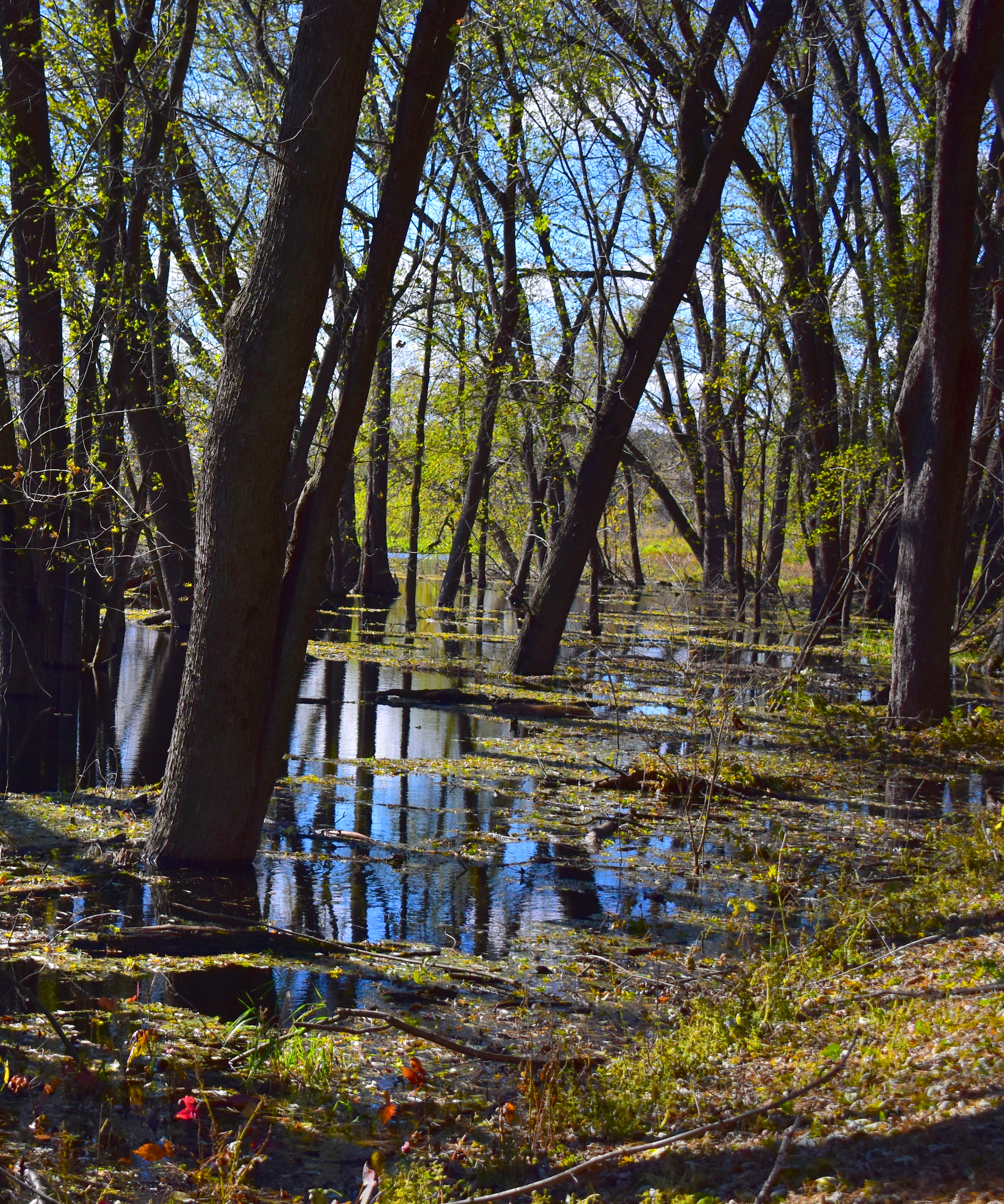
a cloud basks
in dawn’s first rays . . .
the marsh is quiet
but for the wail
of a loon
Gabe always had an artist’s bent. Early on, he was a builder, a civil engineer. Whole cities with houses, tunnels, and waterways, anything you can construct with wet sand. He took up Lincoln Logs and Erector sets—forts with Ferris Wheels—and built a complete, detailed reproduction of the Hanging Gardens of Babylon, a Biblical activity suitable for the Sabbath. He created blanket forts, tree forts, snow forts, igloos, kites, and slings like the one that felled Goliath.
So, it began with invention. The important stuff revolved around how to pack and pile sand, hands scrubbed clean by the grains, knees wet and gritty. Or how to gauge the trajectory of a rock sailing through the air, the snap of the sling against his wrist.
When compelled to write, Gabe looked for a way out. That was one of the arts that would have to wait. Instead, it was all about interior design—rearranging the bedroom every other day, making sure all the stuffed animals were in just the right places, their colors arranged into patterns.
following
the gurgling brook
in his mind . . .
forging a path
to the headwaters
Gabe’s parents couldn’t get along, so they shipped him to Maine where he climbed trees and roamed fields ripe with poetry: the sticky sap of white pine on his fingers, the tang of berries plucked from a field, sunsets to truly seal the day, and walls of rain to split the hovering sky. His falsetto voice rang out hymns in church or played them on his harmonica as he perched on the top of a tree.
Back and forth between relatives, dust never gathering on the wheels. Then came a girl—well, just a kiss, though the flirt would last through summer camp.
a honey bee
floats through the garden
then vanishes
into the folds
of a rose
Junior high was a combination of playing in the band and running. With running, Gabe flew like a bird over the terrain, his streamlined running shoes an extension of his body. Barely a thud on the grass as he sped his way to victory after victory, and with each victory came the urge to achieve more. Sometimes the wind was in his face, other times at his back. Either way, he was in tune with the wind, rain, sun, and snow.
Clarinet? Well, first it was a trombone with which he terrorized the family. Then he learned where to put his fingers on the clarinet and how to wet the reed with his saliva. He was out of tune with the band which played so loudly that no one could hear him, but he found a way to exhale into the instrument that created pleasing sounds, so he made up his own songs.
skipping stones
across the pond . . .
droplets
of late spring rain
on his brow
Then he found Susan. The universe took her away. There was only running left. Not knowing where to run, Gabe took his harmonica just in case.
gazing
at the desert’s edge
compass pointing
into the wind
eyes filled with sand
Weightless, that’s how it felt. Unattached. Drifting toward his roots, then recoiling. The army fixed all that. They took away his harmonica and introduced him to marijuana, LSD, and meth. He responded by drawing pictures inside the drawer in his room, copying images from the covers on packets of papers he used when rolling joints.
the snap of a twig
in the evening twilight . . .
stars come out
floating
as if from a dream
He landed on the street with his thumb out for a ride. Rode a long way from his own insides. A dandelion seed in the wind—nowhere to take root—until out of the mist, a hand drew him in.
Gabe’s romance with education began when he enrolled in a summer drafting class at a nearby community college. Soon, he was a logic tutor.
The hand guided him back to his gifts and opened a world never before imagined. He completed a degree in fine arts and reconnected with music. A taste of normalcy. But the hand could not hold him.
Sex? Yes!
Drugs? Yes!
Rock ‘n’ Roll?
for whenever all else fails
or whenever
Still, more school. Gabe churned out sculptures as if he was flipping burgers at the local diner. They wouldn’t all fit into his apartment, so he started giving them away. He moved to San Francisco and took up residence as a full-time artist, first for recreation and then commercially. With the dawn of home computing, he dove in, first with music. Then he made the mistake of buying some database software. Next thing you know, he was a computer programmer, art, all but forgotten. Programming would absorb his creativity for the next 15 years.
Then came the crash, this time plunging deep into the depression pool: a relationship gone awry, deaths, a job and its perks all lost, hospital stays—more than a couple of Jokers in his deck, everything gone—but just when it seemed most hopeless, something clicked.
dense fog
creeps through the valleys
of his mind . . .
a cat yowls
on the mountain
At 58, it was time for a change. First, the gift of a laptop while he was sequestered in a nursing home. He had already started writing poetry by hand in the hospital. With the computer, he compiled his first book of poetry and began working on a book about his crazy life. Soon, writing was an obsession—hours every day spent at the keyboard, everyone but his favorite nurse thinking he was completely mad.
The book caught up to his life in the nursing home about the time he was ready to discharge. He vowed that when that happened, he would finish the book and spend the rest of his life living as an artist.
And he’s doing that. It’s happening in an apartment the size of a hamster cage but it’s happening. When you’ve lost everything, everything is a blessing. Tell a man he can’t, and watch him do. Gabe is at the apex of his creativity. He has learned that doing doesn’t require running, that being himself is the best gift he can give. There is no more resistance against his nature. Each morning now, as age takes hold, he thanks his stars for another day. He’s learning to balance on a spinning earth, spreading his stories like pollen on a summer breeze.
a flutter
of oak leaves~~
the lightness
of shadows dancing
in this Illinois sunset
Contemporary Haibun Online 17:3
![]()
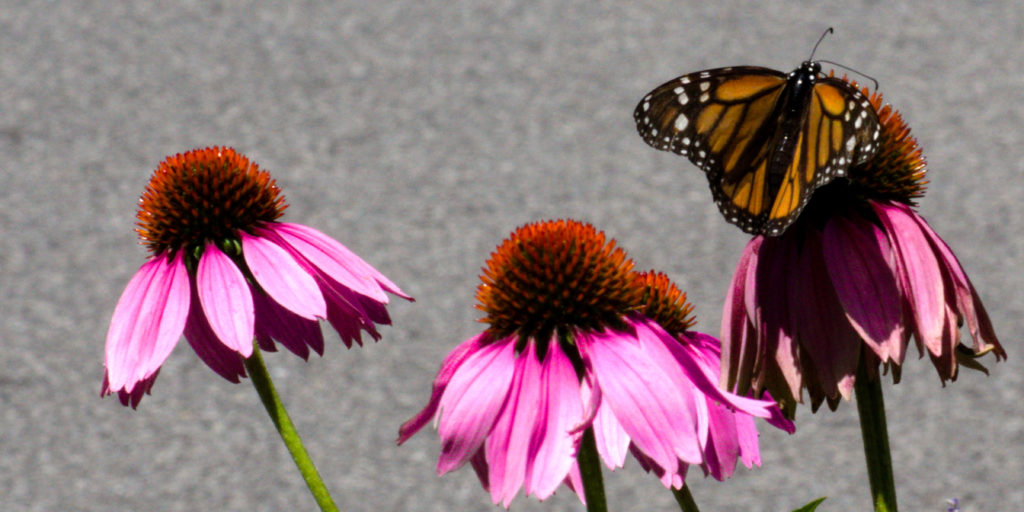
I don’t know much about butterflies. I can recognize a Monarch when I see one, but other than that, they’re just nice to look at. Today a white one, with a wingspan of only about an inch and a half, was flitting around in the garden from hosta to vinca to sunflower to rose but never landing. Maybe it was looking for the best place to rest its wings. To and fro, lifted by the wind occasionally up to twenty feet or more, then zigzagging its way back to the flower bed—it seemed to be searching, but for what? Maybe it just likes to fly, enjoys the garden view. Maybe it’s safer in the air.
I have felt like that insect for most of my life, flitting around, looking for the perfect place to rest. We are different as I wear shoes; it doesn’t have holes in its socks. But we are both travelers, navigating our way through the flowerbed of life. It caught the wind; I chose the road, but now I have a roof and it has the sky. As I watched, I realized there was nothing between us but the rays of the sun.
dressed for the milonga . . .
across the dance floor, she glides,
pauses, glides again
Contemporary Haibun Online 17:3
![]()
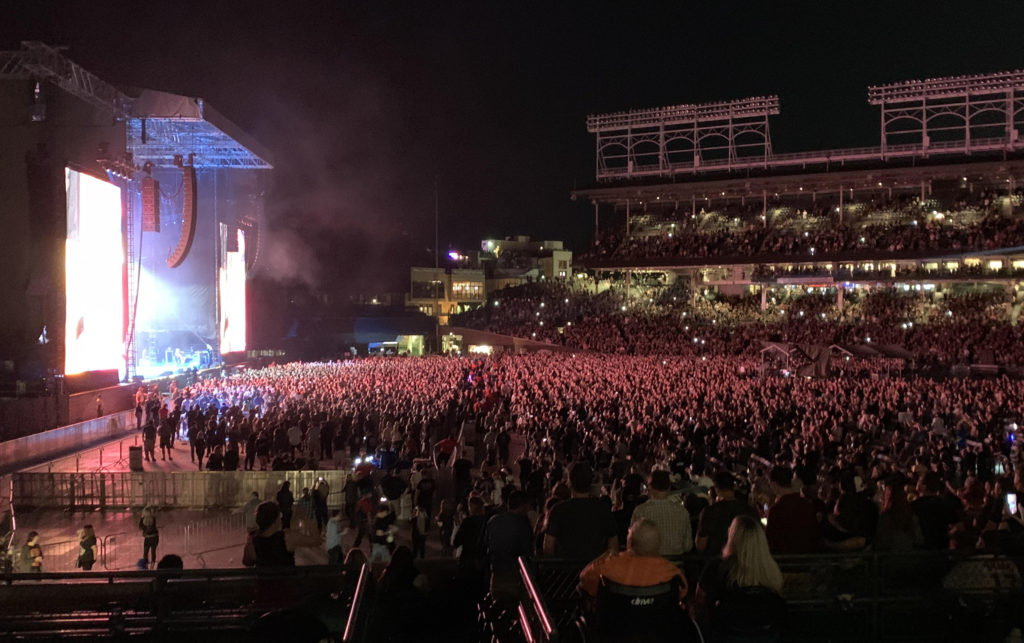
so long quiet night…
the cacophony
of a world awake
is bewitched
by itself
This tale begins at dawn. Eyelids flutter open. Daylight spills in. Covers unfurl. Feet touch the floor. A quick stop at the loo, then off to brew some coffee. Turn on the morning news. Got to catch up with the spinning earth.
Brush teeth, comb hair, and throw on some rags—it’s a rush to beat the morning rush—don’t want to be late. There’s nothing worse than being late.
Don’t forget the keys. It’s a short walk to the train but there’s a long cue at the turnstile. Got to catch that train—don’t want to be late.
Clickety-clack hums the wheels on the rails—cars filled with people with somewhere to go—for a moment, somewhere together. Then we spill onto the street like scattered leaves, minds with different thoughts to fulfill. This swirling soup of energy, one can almost see it breathing. The beating heart of this chaotic dance, one can almost feel it bleeding.
The city wakes from an evening’s dreaming. I merge with it and become obscure. Walking through the throng, I wonder, “Is this what I’m seeking?”
another today
passes by…
a soft wind blows
through the fog
in my mind
Haibun Today: 13.3
![]()
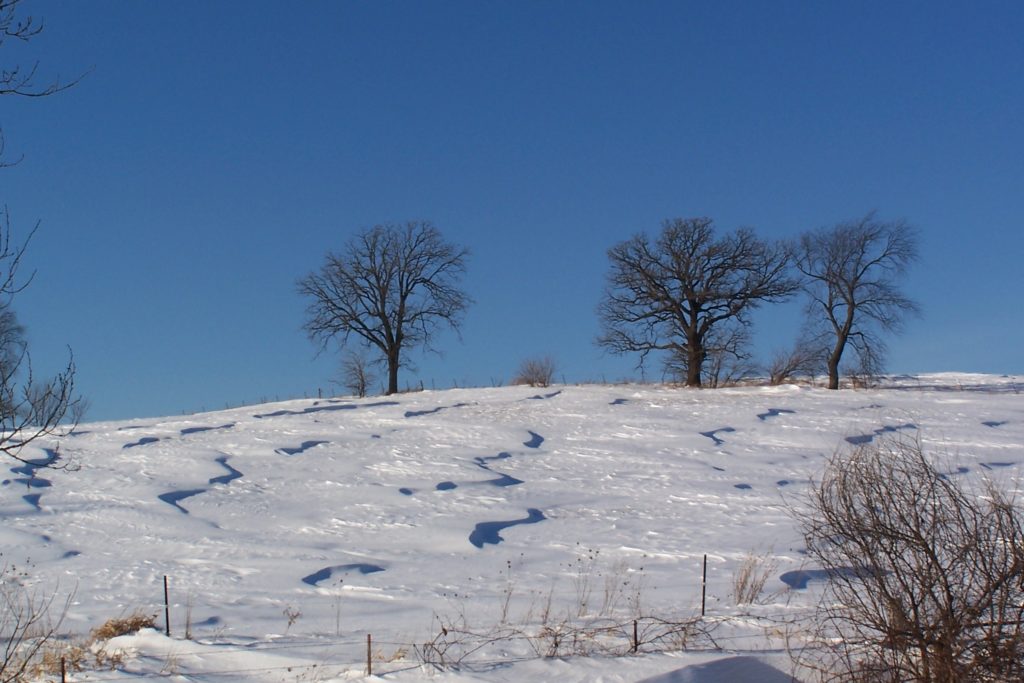
The walking man studies the footprints he’s made in the freshly-fallen snow, footprints meandering back through time, back through time with his thoughts. There he finds a boy playing by a stream, happy as a boy can be. He walks over and says, “Hello.” The boy doesn’t hear. He wants to say “remember this” but all he can do is watch for a while as the child works his way along the bank and finally out of sight.
His thoughts lead back to a grassy field where a young man tosses hay bales onto a wagon. The man in the snow wants to shout “be careful” but again can only watch as the farm cart passes by. He knows the young man has no reason to listen to the wind. Turning up his collar, he shrugs away the cold.
Blowing snow is covering his tracks. He’s watching them fade away. He searches for what is left of her, her footprints in the snow. He wants to tell her “I’m sorry” but the footprints just aren’t there. The trail’s gone cold and he’s walking alone on his way back home in a blizzard.
recollections . . .
layers of settling dust
on the bookshelves
begin to obscure
the stories
Atlas Poetica #37
![]()
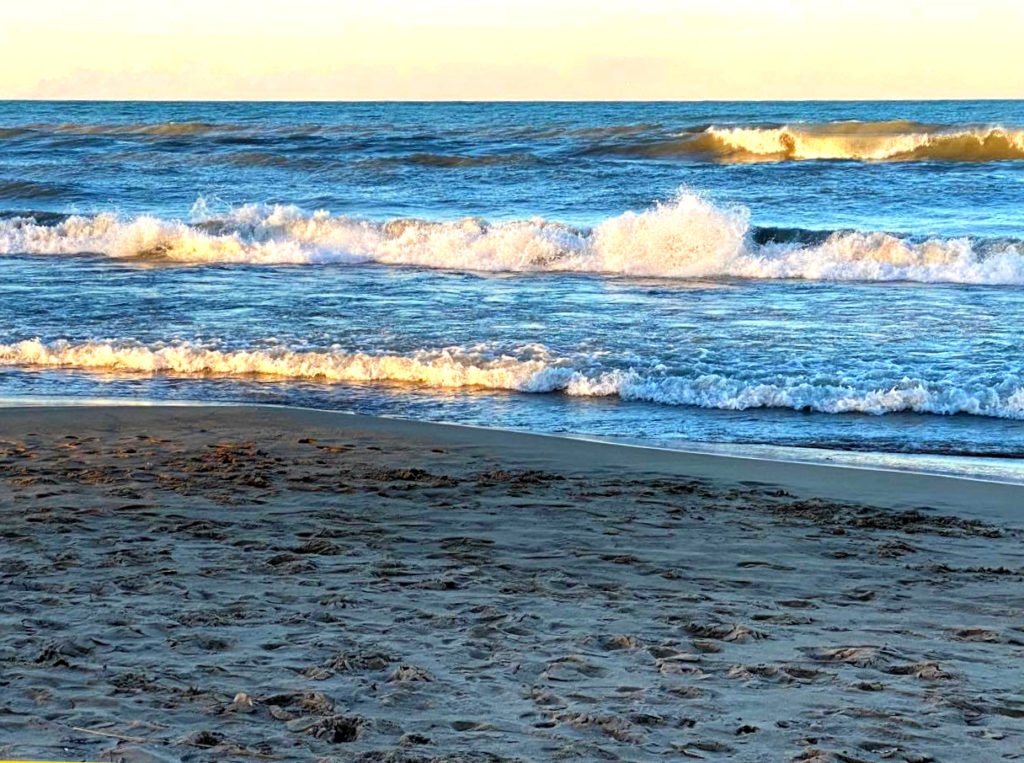
we found each other
in that moment
breaking over the rails,
that moment that swept us
into the sea
If stumbling into misadventure is an art form then we mastered it long ago. Yes, time has passed, and yes, the distance between us is greater than ever. Still, I remember our love of music, our kindred affection for stories, and how we could cry together and laugh in almost a single breath. I can remember that day we danced to Zydeco for hours as the little time we had left together seemed to skip a beat. I remember our happiest moments as if they are happening now.
Were there warning signs? Who knows? What I do know is that the dream imploded as a result of its own design. What remains are simply fragments of that dream. Still, those fragments speak to me, defying the constraints of time. They speak to me of a vision that was, and will always be, a lighthouse on the island in my mind.
born of desire
I cast my net
into the reflection
you left in ripples
on the surface of the stream
Haibun Today June 2019
![]()
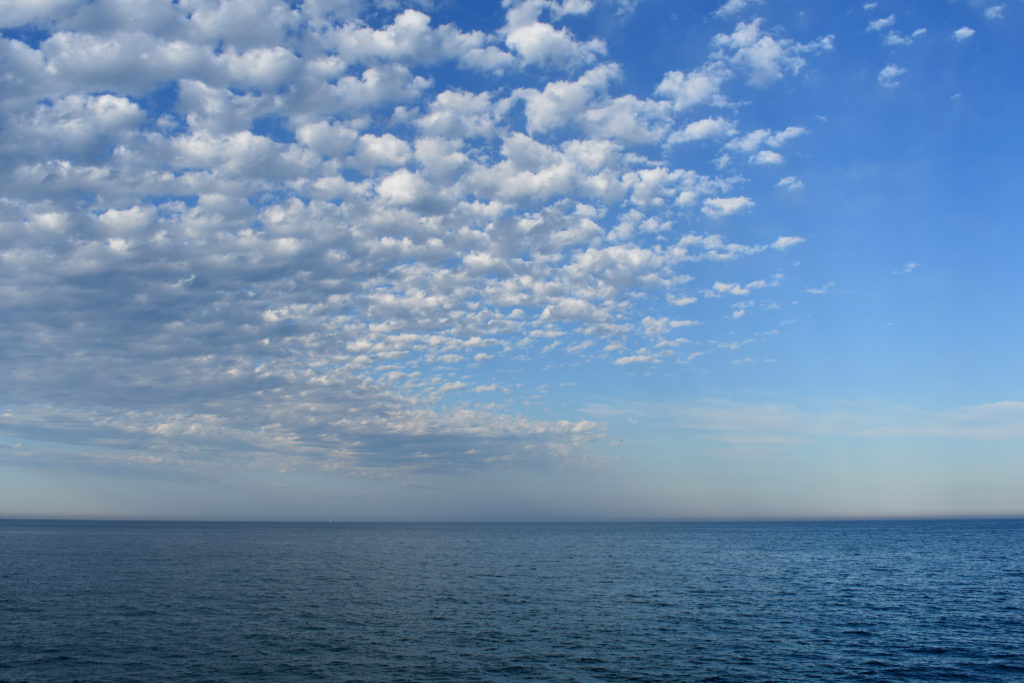
Not too long ago, we were connected by wires. The wires went to places. We had to be at those places if we wanted to spend time with other people in other places.
Grandma and Grandpa’s local phone number was four digits long. At family gatherings, we used to schedule calls from distant family members. On Christmas day, grandchildren would call the house and we would have a phone visit, each cousin, aunt, and uncle passing the phone to the next in a daisy chain conversation beginning and ending with Grandma.
The phone used to be a home device, but we are no longer tied to home. Our circle is contained in digital address books accessible with the touch of a virtual button. We are ever on the go but someone always knows where we are.
operator
five, three, two, six, please . . .
the hum
of starlings flying free
across the airwaves
Ribbons 15 | 2 Spring/Summer 2019
![]()

memories come flooding back . . .
a squall blowing in
across the water,
berries in the hay,
sunsets through a plate glass window
I remember stories
around the kitchen table . . .
kids playing Chinese checkers,
eating popcorn
and laughing at silly things
beside the fire
and fluorescent stones
we chanted hymns
studied myths
and pleaded for our souls
the world was our adventure
the lightness and the dark . . .
castles by the seashore
cast their shadows down the streets
we found to wander
those bygone trails
beyond the garden
finally brought me here to stand
outside your door
tonight
in moonlit poems
these runes unfold
a menagerie of whispers . . .
into your ears a song
this mockingbird is singing
Atlas Poetica 36
![]()
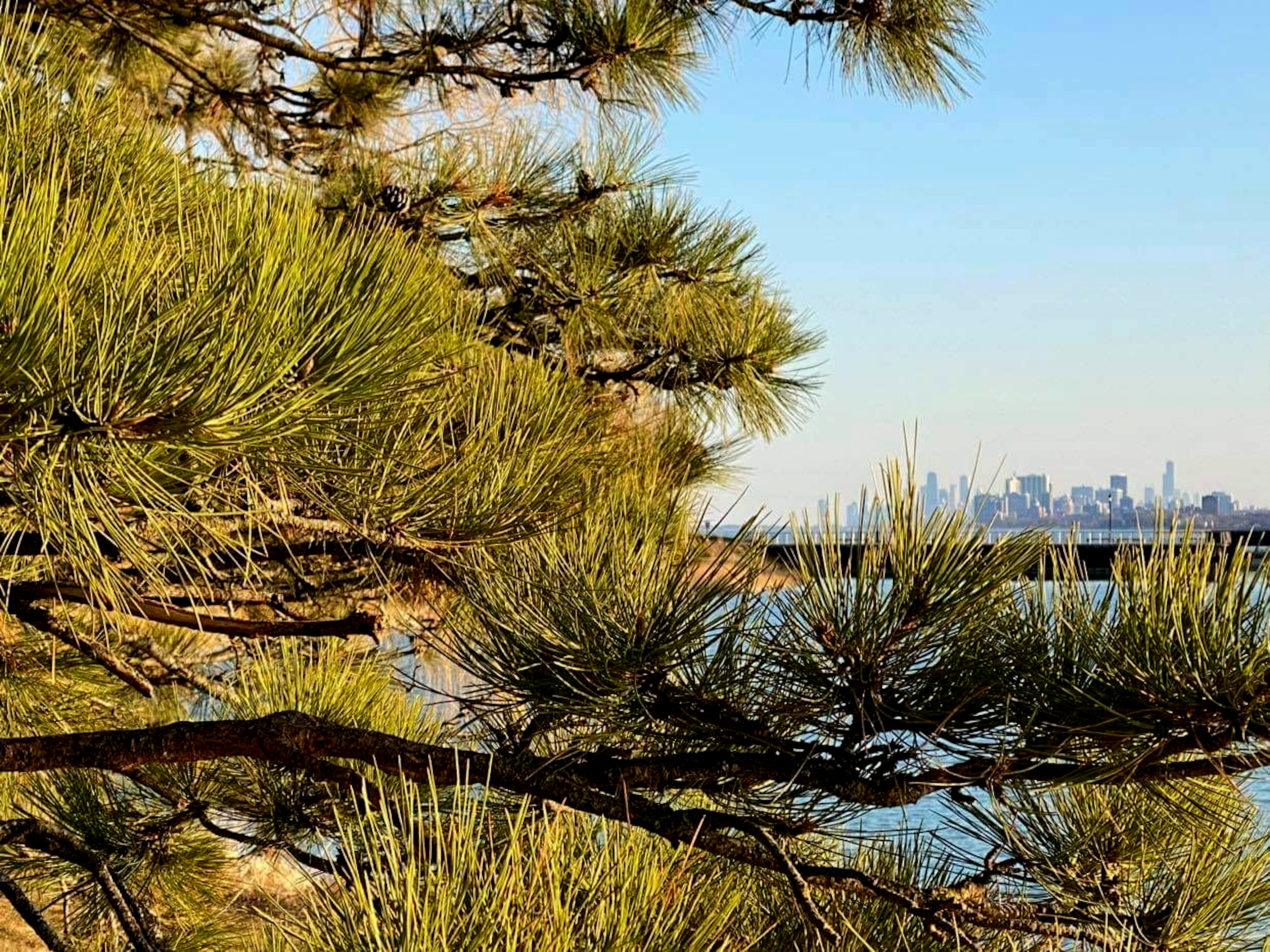
ommmmmmmmmmmmm…
chanting to the echoes
of dewdrops in a teacup
lips invoke
the ancient songs
of life
where petals fall
into the pond—
a blossom
opens up and shares
its secrets
between what is
and the great beyond
an ocean
in a seashell
pounds the shore
one moment and no more
to spend inside eternity
to leave behind
what’s never been
and seek what’s meant to be
…shanti
Atlas Poetica 34
![]()

fussbudgetting
in the basement . . .
even your candor
won’t clean up
this mess
you’re remembered in dreams
and remembered in prayers
I also see you
in a whiff of coffee and
the scent of new-fallen snow
when I close my eyes
you’re standing there
naked
with a pear
in your hands
desert rose
standing by the road
thumb in the air
with headlights on the horizon
you still the rising moon
the obelisk stands
in sharp contrast
to the many weary pilgrims
gathered in its shadow
waiting on their knees
one oar creaks
as it gently dips
into the lake…
I’m rowing
in circles
I listen for the sound
of butterfly wings
of blossoms
and sunshine
and laughter
new growth
in the old forest . . .
the many ways
we’ve discovered
to hold hands
my memory of you
keeps fading away . . .
I’m searching
for a glass of water
poured into the sea
![]()
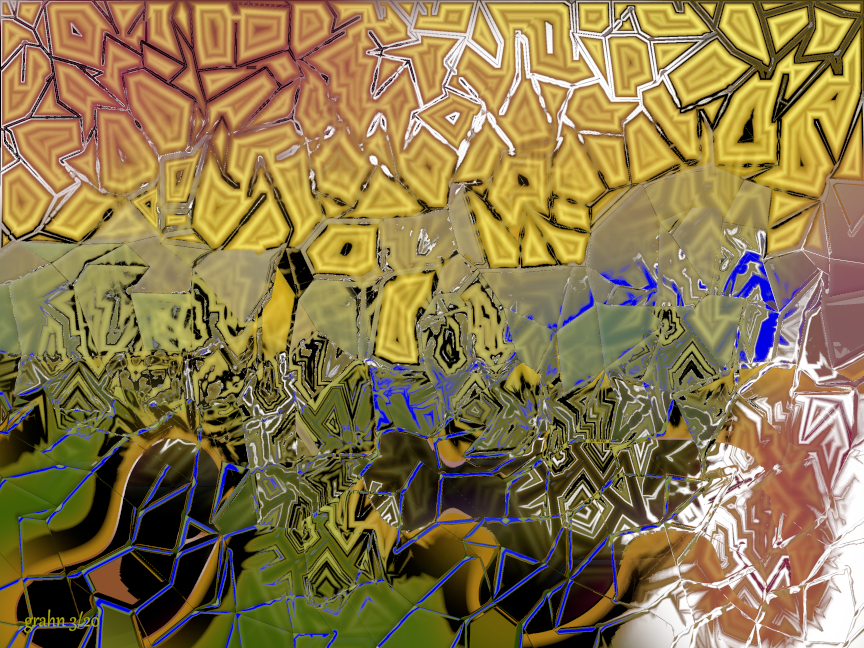
the postage stamp
is canceled
the envelope unopened
inside the perfumed letter
words that can’t get out
news she cannot bear
morning birdsong
delicate crystal chirps
ease me awake
I roll over,
wrap an arm around your waist
and listen to you snore
the generations
we grew up with
are almost gone
but lessons we’ve sown
have already grown
into endless fields of children
morning thunder
stillness may be shattered
and sunrise boldly stolen
but lying here with you
we can watch the falling raindrops
paint the windowpane
around the old stone hearth
we gathered
reciting incantations
smoky whispers
up the chimney
mingled with the evening rain
on that starry August night
I imagined us
lasting forever
but we were just there
holding hands for a moment
meteors piercing sky
we lost our ball
in a field of stories
where grandpa mowed the hay
looking there, picking berries
poking through the grass
now shadows looking back
first evening star
falling into space
I watch
as an unbroken moment
of eternity breaks
with the subtle blink of an eye
wind whispers to a boy
in the branches
oh so very high
not a care
for where he’s going
but wishing he could fly
I’ve found a key
an old key
to your heart
I remember the feel
of this key and the way
we clicked when I turned it
never mind the thorns.
a bucket of berries
makes a pie,” she said.
scratches just skin deep
grandmother’s insight
mighty sweet
storyteller’s tale
is passed around the casket
the ending’s just been reached
so now it’s time to take a hand
and presume to know
what he would surely say
do you remember me?
what was the measure
of that thing that we had?
can you remember
the night we fell for love
and you shared with me the moon?
evening rain
it’s quiet here
beside the fire
let me tell you the story
of how we’re going to fall
in love
scars
it doesn’t matter
where they come from
life comes complete with scars
and now that we have all these scars
we know we have dared to dream
a hint of jasmine
from
the warm bath
I watch from the open door
as she stirs the water
with her toes
as I set down this load
the burdens of my soul
by the side of the road
I can see the lightning
on the horizon
rain reflected in your eyes
an open door
is all that stands
between life and imagination
I step inside
and stop caring
if all I see is real
falling star
you broken-hearted
flicker in the sky
searching for your lover
you’ve wandered through the darkness
to be with me tonight
writing whatever comes to mind
unwinding all the twine
then tying it in knots
to have that freedom
dearly bought
I fought and fought and fought
a new year is coming
the old one was a ball
followed by a train wreck
I was picking through the debris
and found a goodbye letter
tucked inside my shoe
kill me with a whisper
settle these bones with raindrops
beneath a stack of stones
then court my soul
in the great beyond
where together lasts forever
her garden trowel
has turned no earth
for many decades now
As I hold it in my hand
I can almost feel her hand
holding mine
the stars come out
an old man counts them
slowly
calling them by name
as if each one
were his child
cold spring rain
the gray fashions
a cloak around me
I sit here
fumbling with the keys
to my imagination
![]()
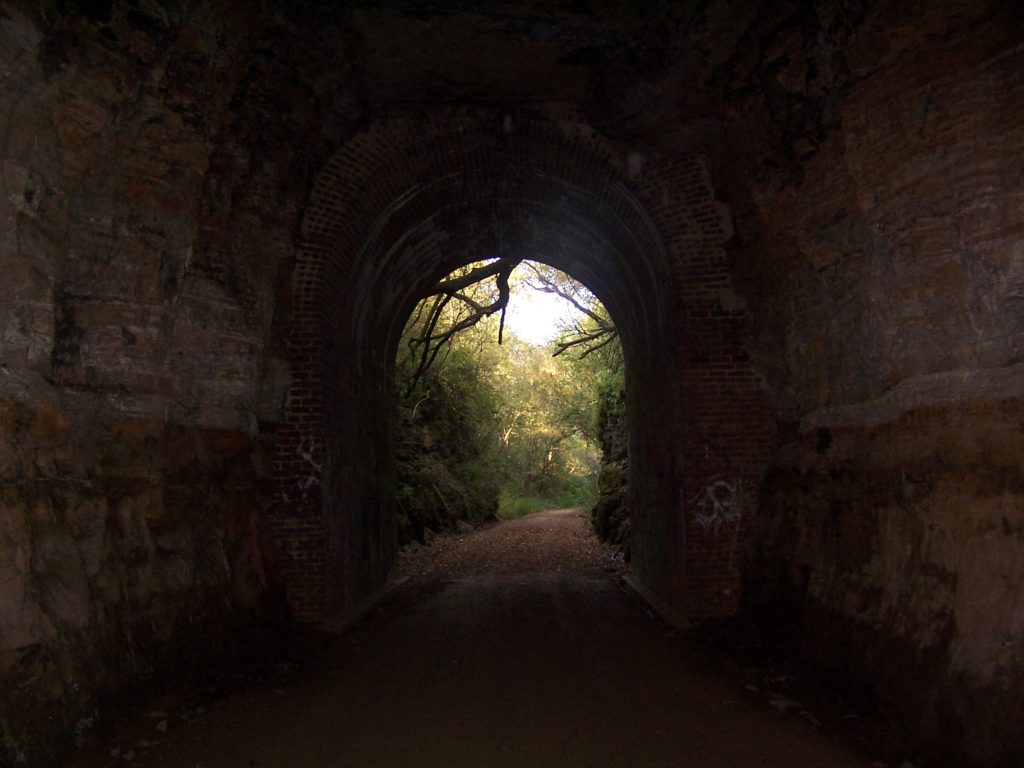
It begins somewhere in the nebulous inklings of REM sleep, at just about midnight, as we’re speeding down a quiet wooded road. Sara has the wheel in a stranglehold. We’re in the midst of a major tiff.
From out of the darkness, a pair of glowering-white eyes suddenly appears in the headlights. Instead of hitting the brakes, Sara flips the overdrive switch. The car leaves the ground with a whoosh and is quickly transformed into a flying carpet in the shape of a raven. Gravity pulls at the pit of my stomach. Sara is nowhere to be seen.
My temper slowly settles to a simmer as the raven-carpet soars higher and higher into the moonless, starlit night. Soon the earth vanishes, and the rug pulls over next to a narrow set of stairs stretching upward in the direction of the constellation Orion. Three hula dancers step forward to greet me with leis in their outstretched hands. They lead the way, swaying hypnotically in the starlight, strewing petals along the steps. Together we climb into an endless realm of sky as my thoughts reach out for Sara.
oh, that I had never left
such echoes in your ears . . .
butterflies
morph into wolves
feasting on my words
Saint Peter stands at the top of the stairs next to Sara and an archangel wielding a trumpet. Suddenly, the horn sounds and the stairs fall away.
Falling is far from flying. There’s no bottom to space. Stars whiz by as a cold sweat pours out onto the sheets. The dream ends with a lurch, and I wake up feeling unworthy.
Haibun Today Volume 12, Number 4, December 2018
http://haibuntoday.com/ht124/TP_Grahn_TheLast.html
![]()
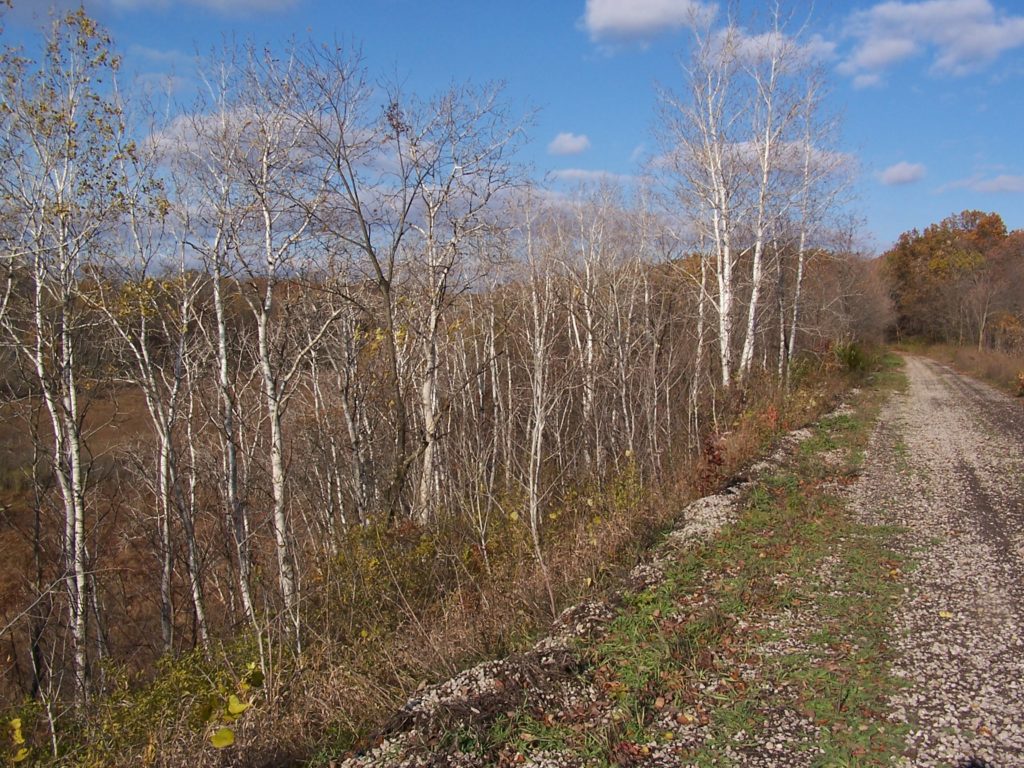
Moving is no fun, but after living in a nursing home for over two years I find it to be an adventure. My stuff, those things that have been languishing in storage all this time, is finally in my possession again. I am rediscovering myself one box at a time. Each box is filled with memories that make looking back both painful and liberating. This vial of Herkimer diamonds, for example, a gift from my favorite rock hound, Grandpa . . . old birthday cards from people who no longer remember my birthday . . . pictures of my last girlfriend . . . aha, my favorite slippers!
Freedom is exhilarating. Not that being cooped-up kept me from expressing myself or expanding my horizons. Heck, during my stay at the nursing home I wrote over 500 poems, made friends outside the home and explored the microcosm of a world around me with staunch enthusiasm. Still, I thank God I’m on my own again.
summer symphony . . .
oh how the meadow
explodes with song
Reborn, my world is full of new and second chances. Now, each memory, each opportunity, each dream is a reason to grow. Every time I look in the mirror, I see a new man, a new creation.
lightning strikes
as the earth keeps spinning
he climbs the mountain
Haibun Today 12 | 4
![]()

March 13, 2018 – My energy normally fluctuates. This piece was written over a period encompassing numerous cycles of said fluctuation.
I’m sitting here typing—trying to write a haibun. The problem is that the medication is getting in the way of my brainwaves. When I’m in my manic state, thoughts flow over the dam in a steady stream. In my supposedly-appropriately-medicated state, the proverbial spillway seems to run a bit dry.
blackened fog
hides the moonlit sky . . .
moths gather in the shadows
Bi-polar disorder is fun, well, that’s until I start thinking I can run the world. Then things start to get a bit complicated. It’s hard to describe when these fingers don’t even have the energy to manipulate the keys. The clock on the wall is ticking. Dust is gathering on the bookshelves and the rays of sunlight have vanished into the solemn hour of midnight.
awake in a dream—
reality bites
my dog
What I know about mental illness is that stability comes with a price tag. To have lived a life benefiting from the adrenaline rush of mania seems at first to be a blessing. But then there’s the curse of grandiose thinking and risky behavior not to mention depression looming on the other end of the bridge.
Here, in the middle of that lonely bridge, there stands a fairy with a medicine box clutched in her outstretched hand. Here, there is no turning back. Here, there is no empathy, no emotion played away on the black and white keys of a grand piano. Here I’m just another cardboard silhouette casually propped up in a department store window. Here, there is no shore. Time traces fingerprints on the window. The window opens and I step out onto the crowded street.
got a problem?
take a pill . . .
follow the winding stream
I take a careful step or two, stagger and then stand still. I pause for another breath and then lean into the wind. I’m not sure where I’m headed but I think I see a light ahead. This dream may really be for nothing but nothing’s ever felt so real.
somewhere buried
deep inside—
a clock-spring marking time
Originally Published: Scryptic Magazine, Issue 1.4
![]()
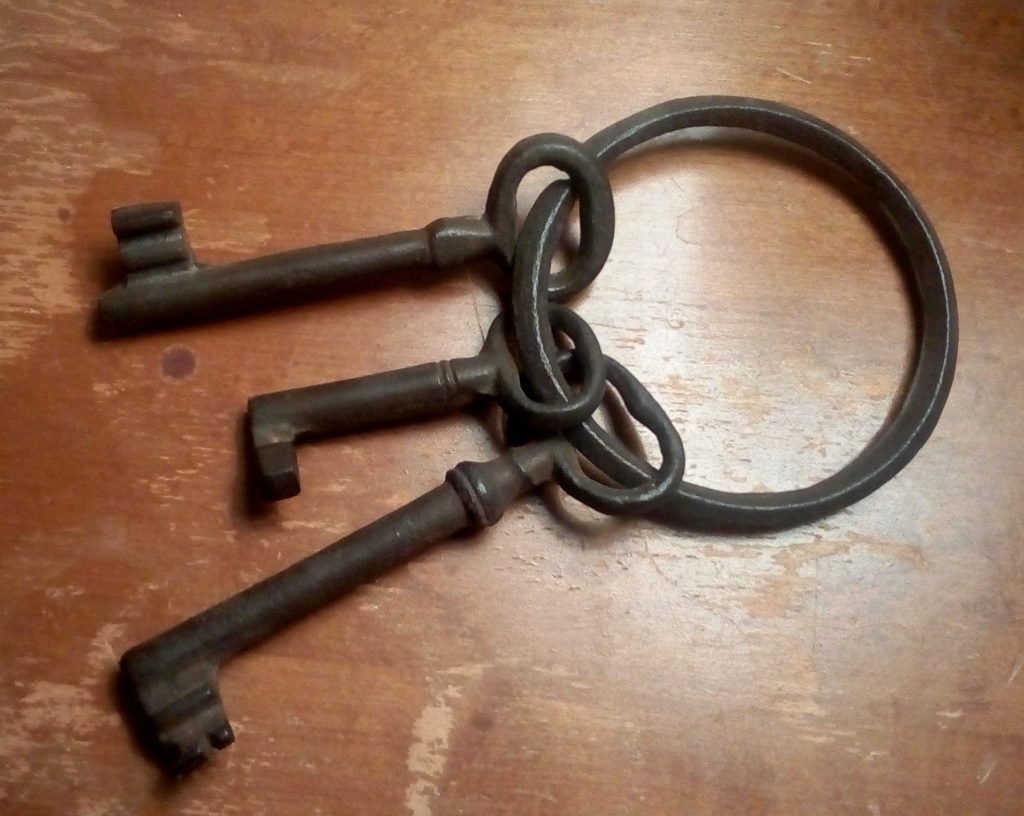
I see a light through the keyhole while fumbling with the keys to my imagination. The faint sliver penetrates the darkness just enough that I can tell it’s there. I try the first key. It doesn’t fit. I try the next and the next. Each is another mismatch. Finally, the last one slips into place. The lock clicks as the key twists. I turn the knob. The door swings wide and daylight spills in.
spring morning
I follow a bee
to the honey
First Published: ColoradoBoulevard.net Poet’s Salon
https://www.coloradoboulevard.net/poets-salon-opening-doors/
![]()
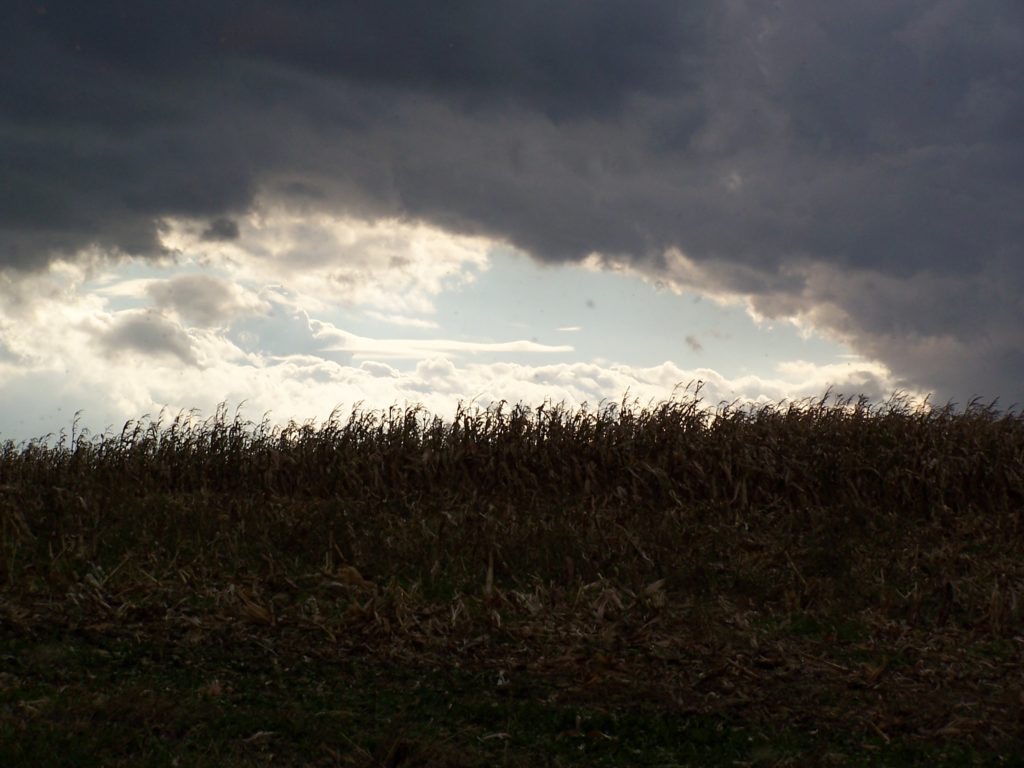
On the therapist’s couch, I wonder aloud what it would be like to bundle all the pain I’ve ever experienced together with any future pains, to feel them all at once and be done with it. I mean everything, from the hangnails, slivers, cuts, and bruises, to the pain of lost relationships and death. I think how overwhelming it would be, how completely unbearable. Still, if getting it all over in one great rush was possible, would it be worth it or would it kill me?
a river overflows
its banks . . .
silence
First published: Narrow Road Literary Journal, April 2019
Page 39
![]()
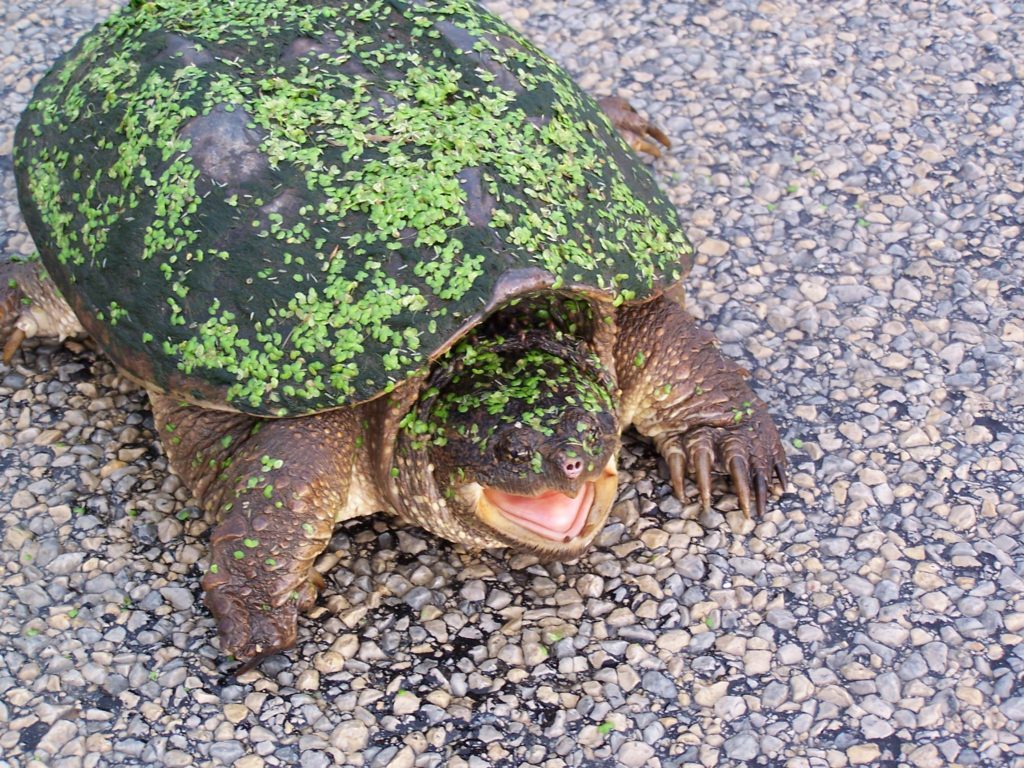
I splash my face
and fumble for a towel…
sleepy shadow
Staring into the mirror, I revisit my present self. Whiskers have returned. Wrinkles all seem in place. Hair still disappearing, a pondering man looks back at me. I grin shyly, recognizing him as the reflection I met in yesterday’s mirror. A calm overcomes me as I leave the old man to reflect, hoping he’ll be there tomorrow.
![]()

The poet eases into his favorite chair, fingers waiting eagerly for a puff of imagination to settle onto the keys. One-by-one, each digit moves and slowly a dance ensues.
He searches for his partner. The muse alights in his mind. They step out onto the page and begin to twirl.
one
the storybook begins
with “once upon a time”
from there we’re left to find a way
to weave our dreams
between the lines
two
many yesterdays ago
there lived a pair on a hill
he walked each day to the spring
to fetch her a cup
of water
three
milady, your hands
fit into mine
as stars fit into the sky . . .
if this is all a dream
then please try not to wake me
one . . .
Haibun Today 13 | 1, March 2019
![]()

a poor harvest
of winter wheat . . .
still, I grind the grain
on the old stone wheel
then sow the fields again
It’s morning. Nails protrude through loose floorboards, throw rugs lie threadbare. Like ghosts, curtains hang over shuttered windows. A steady drip from the kitchen faucet echoes down the hall. The closet door is off its hinges.
The other side of the bed is empty, just as it’s been every morning for the past three years. But I’ve had enough. I get up, throw open the window, pick up my hammer, and start pounding the floor.
Atlas Poetica: 39
![]()
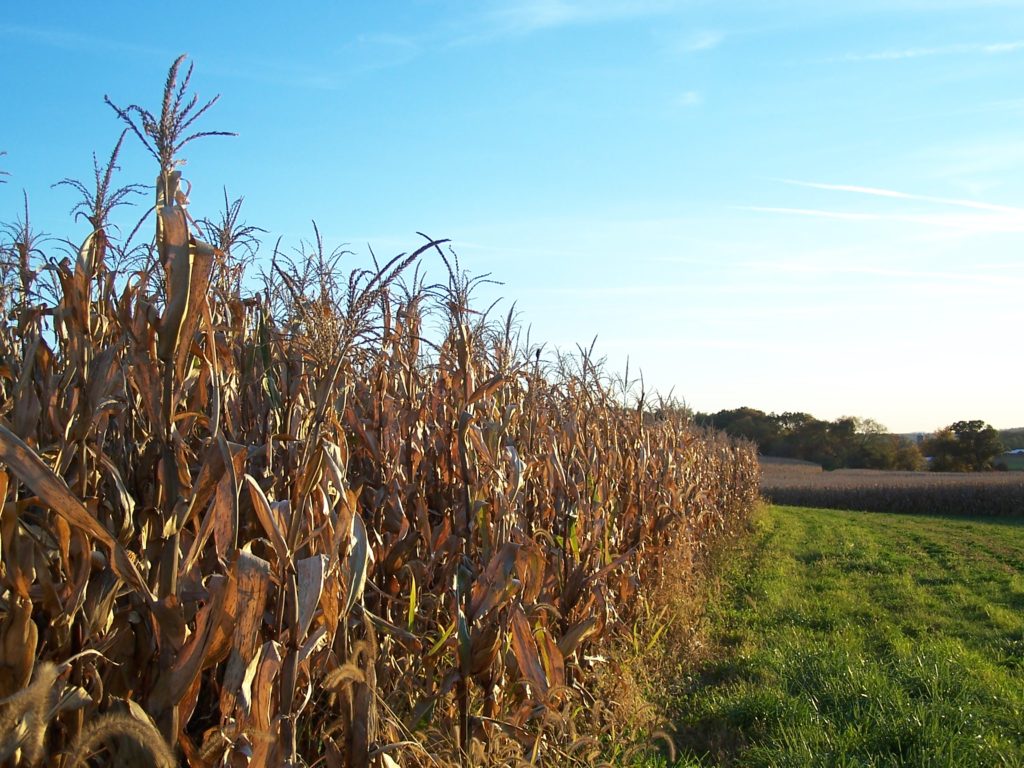
along the byway
to adulthood
an apple tree bloomed . . .
now I pick its fruit
with weathered hands
I’m in rows of corn, running my fingers through the rustling leaves, the scent of earth and pollen in the air. They grow so quickly, these sturdy stalks, taller than my head. Following the contours of the hills, the trail bending and twisting, I discover that the time just before harvest is a pretty good time to get lost.
I burrow into the field, its cocoon wrapping around me until the rest of the world fades away. Every so often a red-winged blackbird stops by to keep me company as we share the last days of summer.
Some people look at a cornfield and see just a field. I see a haven, ripe with adventure and silky ears to whisper to. Turn left at the ladybug and follow the sun; a kid knows the very best places to hide. The secrets of the maize envelope me. I close my eyes and immerse myself in the roots and tassels, pausing along the winding path laid out for me.
following the footsteps
of a wandering child
the poet
finds a verse
scribbled in the soil
![]()